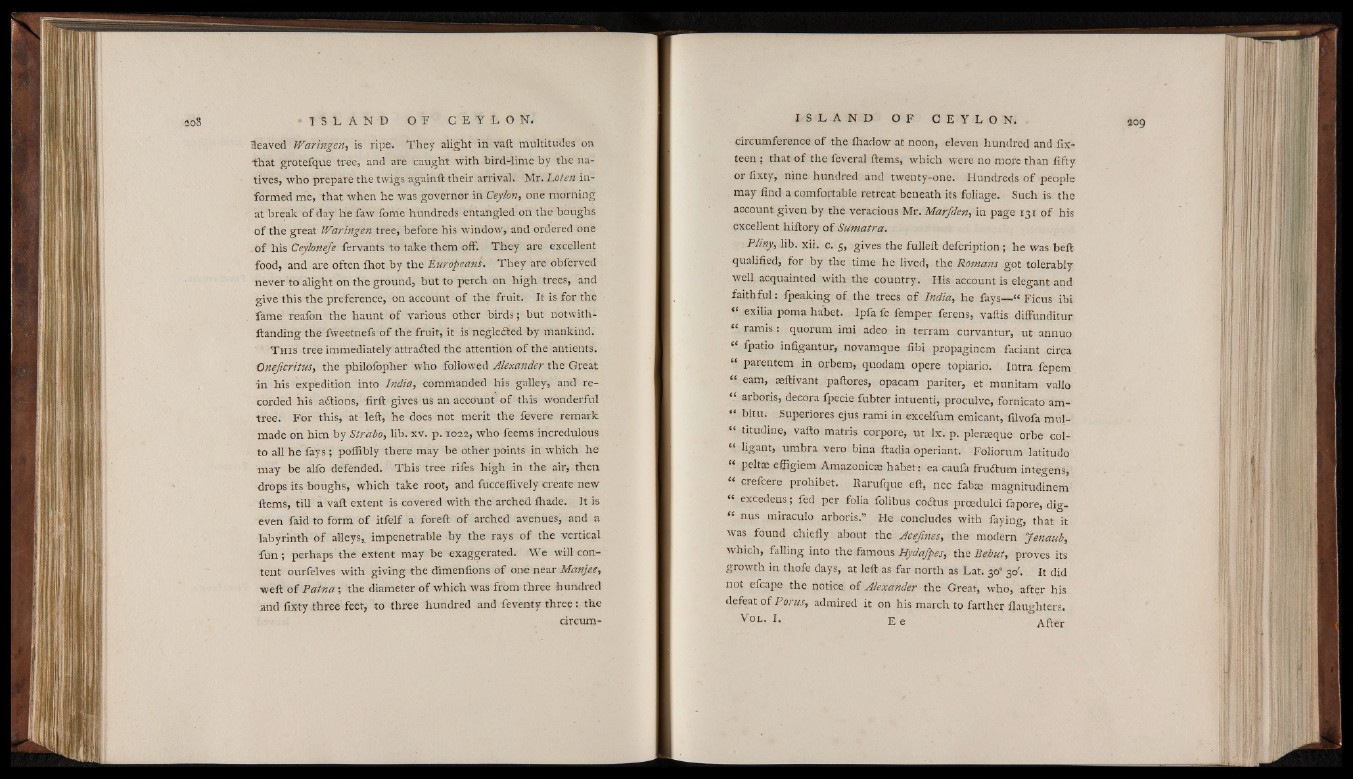
leaved Waringen, is ripe. They alight in vail multitudes on
•that grotefque tree, and are caught with bird-lime by the natives,
who prepare the twigs againft their arrival. Mr. Loten informed
me, that when he was governor in Ceylon, one morning
at break o f day he faw fome hundreds entangled on the boughs
of the great Waringen tree, before his window, and ordered one
o f his Ceylonefe fervants to take them off. They are excellent
food, and are often ihot by the Europeans. They are obferved
never to alight on the ground, but to perch on high trees, and
give this the preference, on account of the fruit. It is for the
fame reafon the haunt of various other birds; but notwith-
ilanding the fweetnefs o f the fruit, it is negle&ed by mankind.
T his tree immediately attrailed the attention of the antients.
Onejicritus, the philofopher who followed Alexander the Great
in his expedition into India, commanded his galley, and recorded
his adlions, firft gives us an account of this wonderful
tree. For this, at left, he does not merit the fevere remark
made on him by Strabo, lib. xv. p. 102a, who feems incredulous
to all he fays; poflibly there may be other points in which he
may be alfo defended. This tree rifes high in the air, then
drops its boughs, which take root, and fucceflively create new
- items, till a vaft extent is covered with the arched ihade. It is
even faid to form o f itfelf a foreft o f arched avenues, and a
labyrinth of alleys,, impenetrable by the rays of the vertical
fu n ; perhaps the extent may be exaggerated. We will content
ourfelves with giving the dimenfions of one near Manjee,
well o f Patna; 'the diameter o f which was from three hundred
and lixty three feet, to three hundred and feventy three; the
circumcircumference
of the lhadow at noon, eleven hundred and fix-
teen ; that of the feveral Hems, which were no more than fifty
or fixty, nine hundred and twenty-one. Hundreds o f people
may find a comfortable retreat beneath its foliage. Such is the
account given by the veracious Mr. Marfden, in page 131 o f his
excellent hiftory of Sumatra.
Pliny, lib. xii. c. 5, gives the fulleft defcription ; he was beft
qualified, for by the time he lived, the Romans got tolerably
well acquainted with the country. His account is elegant and
faithful : fpeaking o f the trees of India, he fays “ Ficus ibi
I exilia poma ha'bet. Ipfa fe femper ferens, vaitis diffunditur
“ ramis : quorum imi adeo in terrain curvantur, ut annuo
“ fpatio infigantur, novamque fibi propaginem faciant circa
“ parentem in orbem, quodam opere topiario. Intra fepem
“ earn, æftivant paftores, opacam pariter, et munitam vallo
“ arboris, decora fpecie fubter intuenti, proculve, fornicato am-
“ bitu. Superiores ejus rami in excelfum emicant, filvofa mul-
“ titudine, vafto matris corpore, ut Ix. p. pleræque orbe col-
“ ligant, umbr3 vero bina ftadia operiant. Foliorum latitudo
“ peltæ effigie m Amazonicæ habet: ea caufa fruaum integens,
“ crefcere prohibet. Rarufque eft, nec fabse magnitudinem
“ excedens; fed per folia folibus coaus prcedulci fapore, dig-
“ nus, miraculo arboris.” He concludes with faying, that it
was found chiefly about the Acejines, the modern Jenaub,
which, falling into the famous Hydafpes, the Bebut, proves its
growth in thofe days, at left as far north as Lat. 30° 30'. It did
not efcape the notice of Alexander the Great, who, after his
defeat of Porus, admired it on his march to farther flaughters.
V ol. I. E e ' After